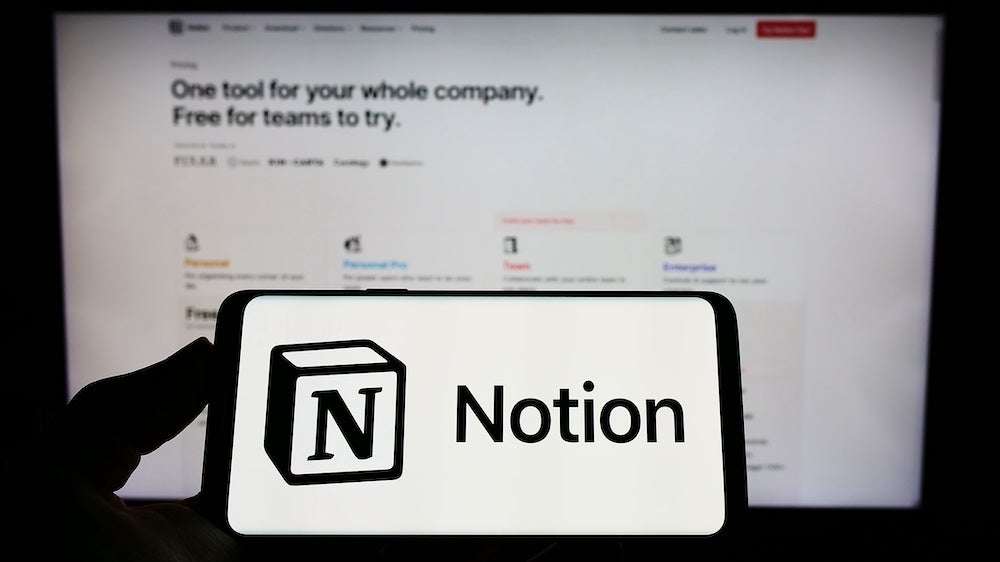Notion’s fast factsPricing: Paid plans start at $8 per user per month, billed annually. Key features:
Take advantage of Notion’s seven-day free trial to see if it’s the right project management tool for your business. |
|---|
|
|
Notion is a multi-purpose, cloud-based app for building custom workspaces using templates. One application for this app is project management, which I tested using Notion’s free base plan.
Project management in Notion may not have some advanced features of other apps, but it runs smoothly and interacts well with third-party app integrations. It’s also great as a collaborative workspace for small and midsize teams.
Compared to many competitors, Notion is more affordable, with more features and applications beyond project management. But, if you’re looking for a tool focused more on project management, we’ve provided a few alternatives to Notion that have an edge.
SEE: Looking for a tool for your enterprise team? Check out these top enterprise project management software.
Pricing
There are four different pricing tiers for Notion, ranging from free to custom-priced plans. Each is designed to suit a different type of team.
Free
The basic free version of Notion includes all of the main features, such as collaborative workspaces, templates and integrations with other apps. However, users have minimal access to page analytics with the free app and can only store page history for one week. Plus, the free version is limited to 10 users.
Plus
For teams of up to 100 users, the Plus version of Notion starts at $8 per user per month, billed annually. This plan includes unlimited blocks, file uploads and 30-day page history. Users not ready to commit to an annual contract can pay $10 per user per month to stay on a monthly billing plan instead.
Business
The Business tier is ideal for most small to midsize businesses. It includes a few additional features, such as bulk PDF exporting, private team spaces and SAML single sign-on. It allows up to 250 users. The Business tier costs $15 per user per month if billed annually or $18 per user per month if billed monthly.
Enterprise
Teams larger than 250 people will need a specialty Enterprise plan to use Notion. This plan gives teams access to features like a custom guest limit, a dedicated success manager from Notion and advanced security options. Enterprise tier plans use custom pricing.
Key features of Notion
Templates
Notion is a highly versatile app. It can be a daily planner, design portfolio, social media calendar and more. Though dozens of templates are available in Notion, you can also build your own or use ones others have shared online.
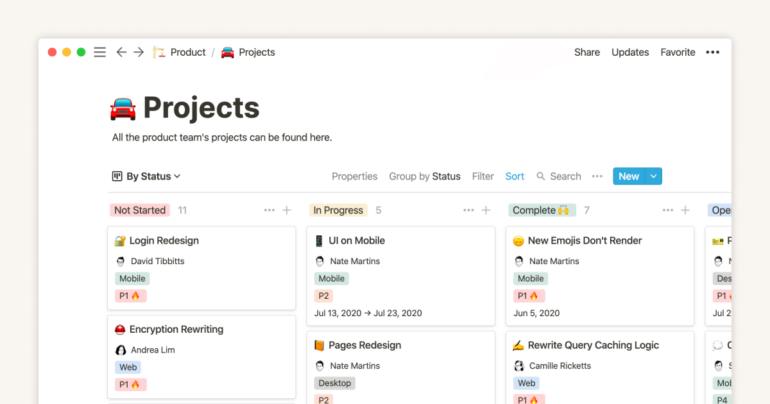
The template I used for project management in Notion is one of the built-in templates known as “Projects & tasks.” This template is ready to go for tracking progress on projects, assigning team members to different tasks within projects, and managing statuses and priorities. By default, there are six project traits — name, status, assignee, due date, priority and tags.
Multiple Views
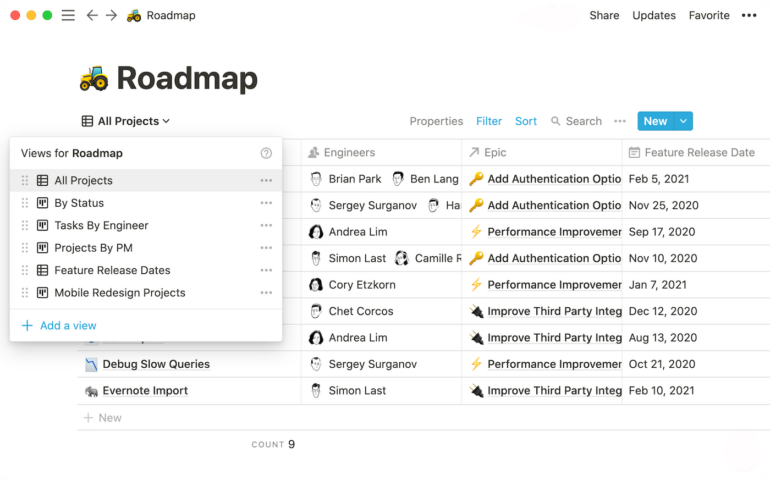
One feature I found especially useful about Notion’s project management template is the various views available. You can view the same set of projects and tasks by project, by assignees, in block-like board format, as a list and even as a timeline. The timeline view will also show you projects dependent on other tasks.
Integrations
One particularly convenient feature of Notion is its integrations with other apps. Notion is a highly compatible platform optimized for pulling in content from third-party sources. For example, I was able to use Notion’s app integration to connect it with Box, so I could add files from the cloud to my Notion projects. This was helpful for file sharing, especially since Notion is good at formatting content from other apps.
AI Assistant
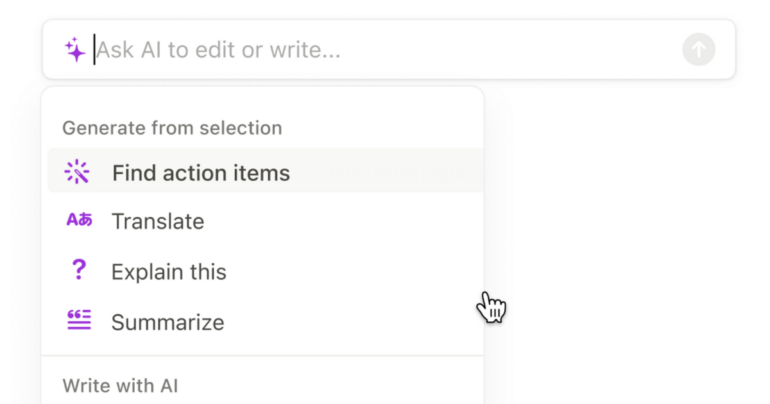
Although I didn’t use it much for project management, Notion’s artificial intelligence tool can be helpful for building project reports and analyzing project data. The app’s AI can summarize content, suggest next steps, highlight important info, edit content, translate and even explain complex content. It works a lot like ChatGPT but is built right into Notion.
It’s worth noting that access to Notion AI requires a monthly subscription, starting at $8 per user per month when billed annually or $10 per user per month when billed monthly.
Pros
- Simple and straightforward interface: Notion’s greatest strength is its simplicity. Notion may not have unique features, but that can be an advantage for many users.
- Versatile free plan: Includes all of the basic features you would want in a project management system without extra ones many teams don’t need.
- User-friendly and easy to learn: The built-in project management template has a minimalistic design and intuitive set up process.
- Increased efficiency with integrations and AI: Thousands of integrations with popular software and Notion’s own AI solution get projects completed faster.
Cons
- Advanced controls are a premium feature: Only the paid Enterprise plan includes access to advanced controls and features that make it much more functional.
- Not suitable for any sized business: For larger teams, Notion can get unwieldy when trying to manage a couple dozen or more projects.
- Extra customization needed for maximum efficiency: Notion was not purpose-built for businesses compared to other apps. For example, the “board” view in Notion can work somewhat like a kanban board, but it requires a bit of trial and error with custom settings and filters.
Who is Notion best for?
Notion is ideal for small- to medium-sized teams who want a simplistic yet functional project management platform. As a platform, Notion is more of a Swiss army knife with many different applications and tools built in. This means it’s good at many things but doesn’t try to break new ground in anything.
That said, Notion can still be high-value. Businesses get a project management platform and collaborative workspaces for various projects and tasks, ranging from accounting to design. So, Notion’s versatility as a project management application means it can fit almost any business use case.
The collaboration aspect of Notion is where it shines most. If your team wants to be able to work together on many things, it could be a great fit.
And Notion is a good option for those looking to use AI for project tasks, such as automation, editing and note taking. The ability to connect the ready-made AI from Notion directly to your workspace is convenient for fans of AIs like ChatGPT.
Best Notion integrations
There are thousands of integrations available today to connect to your Notion workspace, including top business apps like Slack and Microsoft Office. For example, I used Box for cloud file sharing.
GitHub, Hubspot and Google Calendar also have Notion integrations. Due to the popularity of these apps, they have all been optimized to work well with Notion. Some integrations that work particularly well with Notion include:
- NotionMetrics: A data and analytics integration that allows you to pull metrics from various sources into your workspace, including Google Analytics and Stripe.
- Whimsical: A collaboration-focused integration that adds additional features for using Notion as a team, including collaborative documents and boards.
- Google Calendar: This must-have integration allows you to embed your whole Google Calendar in your Notion workspaces.
- Zoom: With this integration, you can easily connect the popular video conferencing platform Zoom to your Notion workspaces, adding a vital remote work feature.
- Notion Charts: This unique integration simplifies data visualization in Notion by connecting your Google Sheets data to charts and graphs in your workspace.
If Notion isn’t ideal for you, check out these alternatives
Notion isn’t right for everyone, so it’s worth taking a look at some alternative apps on the market today.
| Software | Notion | monday work management | ClickUp | Evernote |
|---|---|---|---|---|
| Multiple project views | Yes | Yes | Yes | Yes |
| Automations | Yes | Yes | Yes | Requires third-party apps |
| Native time tracking | Yes | Yes | Yes | |
| Integrations | Yes | Yes | Yes | Yes |
| Free plan | Yes | Yes | Yes | Yes |
| Starting price (billed monthly) | $10 per user | $10 per user | $9 per user | Contact sales |
monday.com
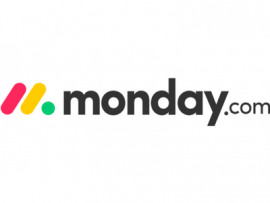
monday work management is a highly customizable and well-rounded project management system. Its built-in automations and file sharing capabilities make it an ideal application for teams that want the ability to streamline project collaboration.
Compared to Notion, monday work management has a more robust set of project management capabilities. Teams looking for a strong project management focus in their tool may prefer it over Notion.
SEE: For more information, check out our full monday Work OS review.
ClickUp
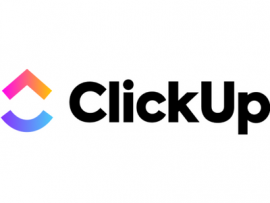
ClickUp is a flexible project management software great for Agile workflows. Similar to monday work management, it offers a high level of customization as well as native time tracking and a larger pool integration options. It also features native time tracking.
Like Notion, ClickUp is generally better for small or midsize businesses. But with its support for Agile workflows, ClickUp may be a better choice for developer teams and businesses that follow that methodology.
SEE: For more information, check out our full ClickUp review.
Evernote
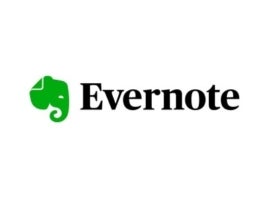
If simplicity is your goal, then Evernote may be a more intuitive alternative to Notion. Evernote bills itself as a note-taking platform. But with task management features and the ability to integrate with calendars and collaboration platforms, Evernote can be an effective and efficient project management tool.
While it has fewer features than Notion, Evernote is specifically designed for note-taking and is available across multiple platforms. Smaller teams looking for simple project planning and task management may appreciate Evernote over Notion.
SEE: Check out how Evernote compares to our list of the top mind mapping tools.
Review methodology
I tested out Notion’s built-in project management template as a complete beginner. I created projects and worked through making project notes, creating subtasks, managing project properties and scheduling tasks.
While testing, I tried out each of the main views built into this template and experimented with adding custom views and properties. I compared my unbiased experience using these features with similar project management tools currently available.
If Notion still doesn’t seem like the right fit, check out our list of the best free project management software.
